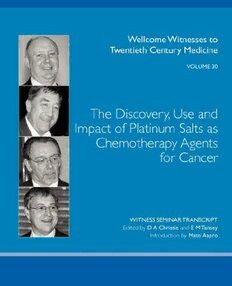
The Discovery, Use and Impact of Platinum Salts as Chemotherapy Agents for Cancer (Wellcome Witnesses to Twentieth Century Medicine Vol 30) PDF
149 Pages·2007·1.8 MB·English
Most books are stored in the elastic cloud where traffic is expensive. For this reason, we have a limit on daily download.
Preview The Discovery, Use and Impact of Platinum Salts as Chemotherapy Agents for Cancer (Wellcome Witnesses to Twentieth Century Medicine Vol 30)
Description:
Serendipity played a large part in the discovery of the biological actions of the simple platinum coordination complexes. In the mid-1960s, Professor Barnett Rosenberg and colleagues found that a simple platinum-based compound prevented bacteria from dividing normally. He tested the compound on cancer cells and showed that it was biologically active. Cisplatin has since emerged as one of the most widely prescribed anticancer agents. Cisplatin has been shown to be effective either alone or in combination for the treatment of a wide variety of solid cancers in man, including testicular and ovarian cancers. It is also palliative in the treatment of cancers of the head and neck, bladder, prostate, lung, cervix, and in some paediatric cancers. Toxic side effects of the drug include damage to the kidney and severe side effects include such nausea and vomiting that patients have been known to refuse treatment. In turn, the cisplatin-induced emesis provided a major stimulus for research into anti-emetics, which has provided several effective drugs for the relief of many kinds of nausea and vomiting, especially that associated with radio- and chemotherapy. The relief of such toxic side effects has been an important factor in encouraging patients to continue successfully otherwise unpleasant forms of cancer therapy. Participants who attended this Witness Seminar include representatives from several areas of work on the platinum compounds: chemists who worked with Rosenberg; oncologists who pioneered their use clinically; and pharmacologists who examined the emetic properties of these compounds, and devised, in particular, the 5HT3 receptor antagonists
See more
The list of books you might like
Most books are stored in the elastic cloud where traffic is expensive. For this reason, we have a limit on daily download.
